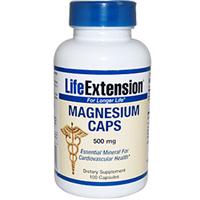By Kevin Cann – Steroidal.com
There are many individual nutrients that are praised for having many health benefits. A lot of these nutrients also are important for athletic performance. A simple Google search of a specific nutrient and athletic performance can yield quite a bit of results. With that said we cannot underestimate the benefits of a diet high in nutrient rich foods.
A diet high in nutrient dense foods can supply us with all of the essential minerals and vitamins to help us maximize our health and athletic performance. There are some nutrients however, that are more difficult to get due to the quality of our soil and food products and also some nutrients that get depleted when we are under high levels of stress. Intense athletic performances are high levels of stress.
One important nutrient to consider for health reasons as well as for performance would be a magnesium supplement. In terms of bone mineral density and preventing osteoporosis, magnesium may be even more important than calcium (1). I do not think it is as simple as one mineral is more important than another. Magnesium needs to be in balance with calcium, vitamin K2, and vitamin D to build new bone mineral density. They are all as important as the next.
 Magnesium supplementation may also be beneficial for your heart. Studies have shown that lower plasma magnesium concentrations and lower magnesium intakes lead to increased risk of cardiovascular diseases (2). That study was an epidemiological study that shows correlation without causation so more research needs to be conducted to validate these results.
Magnesium supplementation may also be beneficial for your heart. Studies have shown that lower plasma magnesium concentrations and lower magnesium intakes lead to increased risk of cardiovascular diseases (2). That study was an epidemiological study that shows correlation without causation so more research needs to be conducted to validate these results.
Magnesium also plays a vital role in athletic performance. It is a major catalyst of our ability to create adenosine triphosphate (ATP), our source of fuel. In fact, ATP is actually bound to magnesium. Even a small deficiency in magnesium can hinder athletic performance and can magnify the effects of oxidative stress of high intense performances. Basically, this means that a magnesium deficiency will not only decrease our ability to create biologically available ATP, but it can also limit our body’s ability to recover from our high intense exercise bouts. Here is an abstract from researchers about the implications that magnesium may have on performance.
“Magnesium is involved in numerous processes that affect muscle function including oxygen uptake, energy production and electrolyte balance. Thus, the relationship between magnesium status and exercise has received significant research attention. This research has shown that exercise induces a redistribution of magnesium in the body to accommodate metabolic needs. There is evidence that marginal magnesium deficiency impairs exercise performance and amplifies the negative consequences of strenuous exercise (e.g., oxidative stress). Strenuous exercise apparently increases urinary and sweat losses that may increase magnesium requirements by 10-20%. Based on dietary surveys and recent human experiments, a magnesium intake less than 260 mg/day for male and 220 mg/day for female athletes may result in a magnesium-deficient status. Recent surveys also indicate that a significant number of individuals routinely have magnesium intakes that may result in a deficient status. Athletes participating in sports requiring weight control (e.g., wrestling, gymnastics) are apparently especially vulnerable to an inadequate magnesium status. Magnesium supplementation or increased dietary intake of magnesium will have beneficial effects on exercise performance in magnesium-deficient individuals. Magnesium supplementation of physically active individuals with adequate magnesium status has not been shown to enhance physical performance. An activity-linked RNI or RDA based on long-term balance data from well-controlled human experiments should be determined so that physically active individuals can ascertain whether they have a magnesium intake that may affect their performance or enhance their risk to adverse health consequences (e.g., immunosuppression, oxidative damage, arrhythmias)” (3).
The authors stated that strenuous exercise may require an increase of 10-20% of magnesium to counteract it. This is important, because that is a huge difference. A large portion of the population of the United States is deficient in magnesium. Some studies suggest that upwards of 80% of the population may be deficient in magnesium from diet alone (4).
If we take part in strenuous physical activity daily and we are already in a deficient state then this only makes matters worse. I always recommend that my clients take a magnesium supplement whether for health reasons or for athletic performance. I recommend taking in a supplement of roughly 150mg of magnesium per day.
For athletes I recommend taking a relaxing Epsom salt bath after strenuous workouts and at least once a week. This helps the recovery process in a couple of ways. It helps to replenish lost magnesium from sweat and activity and it also helps the athlete relax. Initiating a response from our parasympathetic nervous system can help us relax and recover faster from more strenuous workouts as well. Try adding some magnesium supplementation to your routine and see what benefits you get from it.
References:
[1]. BMC Musculoskeletal Disorders 2003, 4:7 doi:10.1186/1471-2474-4-7
[2]. Am J Clin Nutr December 2010 ajcn.002253
[3]. Magnes Res. 2006 Sep;19(3):180-9.
[4]. http://www.jigsawhealth.com/resources/magnesium-mineral-deficiency
